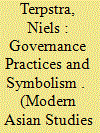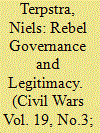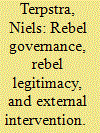|
|
|
Sort Order |
|
|
|
Items / Page
|
|
|
|
|
|
|
| Srl | Item |
| 1 |
ID:
160169


|
|
|
|
|
| Summary/Abstract |
This article focuses on how the Liberation Tigers of Tamil Eelam (LTTE) insurgency performed de facto sovereignty and public authority in Northeastern Sri Lanka. It is situated within the wider academic debate on governance by state and non-state actors. We venture to unravel the complex linkages between the LTTE's governance practices and legitimation strategies by looking at narratives, performances, and inscriptions. While monopolizing the justice and policing sectors, in other sectors the LTTE operated pragmatically in conjunction with the state. The organization tried to generate and sustain public authority and legitimacy through a variety of violent and non-violent practices and symbols. It ‘mimicked’ statehood by deploying, among others, policing, uniforms, ceremonies, nationalist songs, commemorations of combatants, and the media. This not only consolidated its grip on the Northeast, but also engineered a level of support and compliance. We conclude that the LTTE's governance included practices that were created and carried out independently from the Sri Lankan state, while others took shape within a pre-existing political order and service provision by the state. The article elucidates the LTTE's mimicry of the state, as well as the operation of parallel structures and hybrid forms of state-LTTE collaboration. This facilitates a nuanced understanding of rebel governance beyond a simple state versus non-state binary.
|
|
|
|
|
|
|
|
|
|
|
|
|
|
|
|
| 2 |
ID:
188005


|
|
|
|
|
| Summary/Abstract |
Even though Kunduz province in Afghanistan was under relatively firm government control in 2011, the Taliban insurgency was able to consolidate its power throughout the province in the years that followed and to temporarily take-over the provincial capital of Kunduz city for the first time since the U.S.-led intervention in 2001. Based on field research in 2013 and 2016, I argue that the Taliban’s upsurge took place because of a favorable opportunity structure for the insurgency that coincided with sufficient organizational capacities and a sense of urgency among the Taliban’s senior leadership.
|
|
|
|
|
|
|
|
|
|
|
|
|
|
|
|
| 3 |
ID:
157232


|
|
|
|
|
| Summary/Abstract |
Based on extensive fieldwork in Sri Lanka, we analyze how the Liberation Tigers of Tamil Eelam (LTTE) acquired legitimacy and how legitimation impacts civilian perceptions of the rebels. Despite the LTTE’s reliance on coercion to induce compliance, civilians also supported the LTTE and their imagined state of Tamil Eelam voluntarily. Different LTTE strategies and acts helped creating legitimacy. Effective forms of legitimation were rooted in Tamil nationalism, tradition, charismatic leadership, sacrifices made by LTTE cadres and the people’s need for protection. However, the strong reformative socio-political agenda of the LTTE largely failed to engender legitimacy among the population.
|
|
|
|
|
|
|
|
|
|
|
|
|
|
|
|
| 4 |
ID:
173387


|
|
|
|
|
| Summary/Abstract |
This article focuses on rebel governance and rebel legitimacy during civil war. It investigates how external intervention in support of an incumbent government and withdrawal of external forces shape rebel legitimacy dynamics and rebels’ opportunities to govern. It adopts a longitudinal perspective on Afghanistan’s Taliban, analyzing three phases of the movement’s existence. Moral forms of legitimacy resonated particularly during instances of external intervention, whereas pragmatic forms of legitimacy became more relevant after the withdrawal of external forces and during periods of the Taliban’s opponents’ ineffective governance. The article is based on a literature review and fieldwork in Afghanistan.
|
|
|
|
|
|
|
|
|
|
|
|
|
|
|
|
|
|
|
|
|